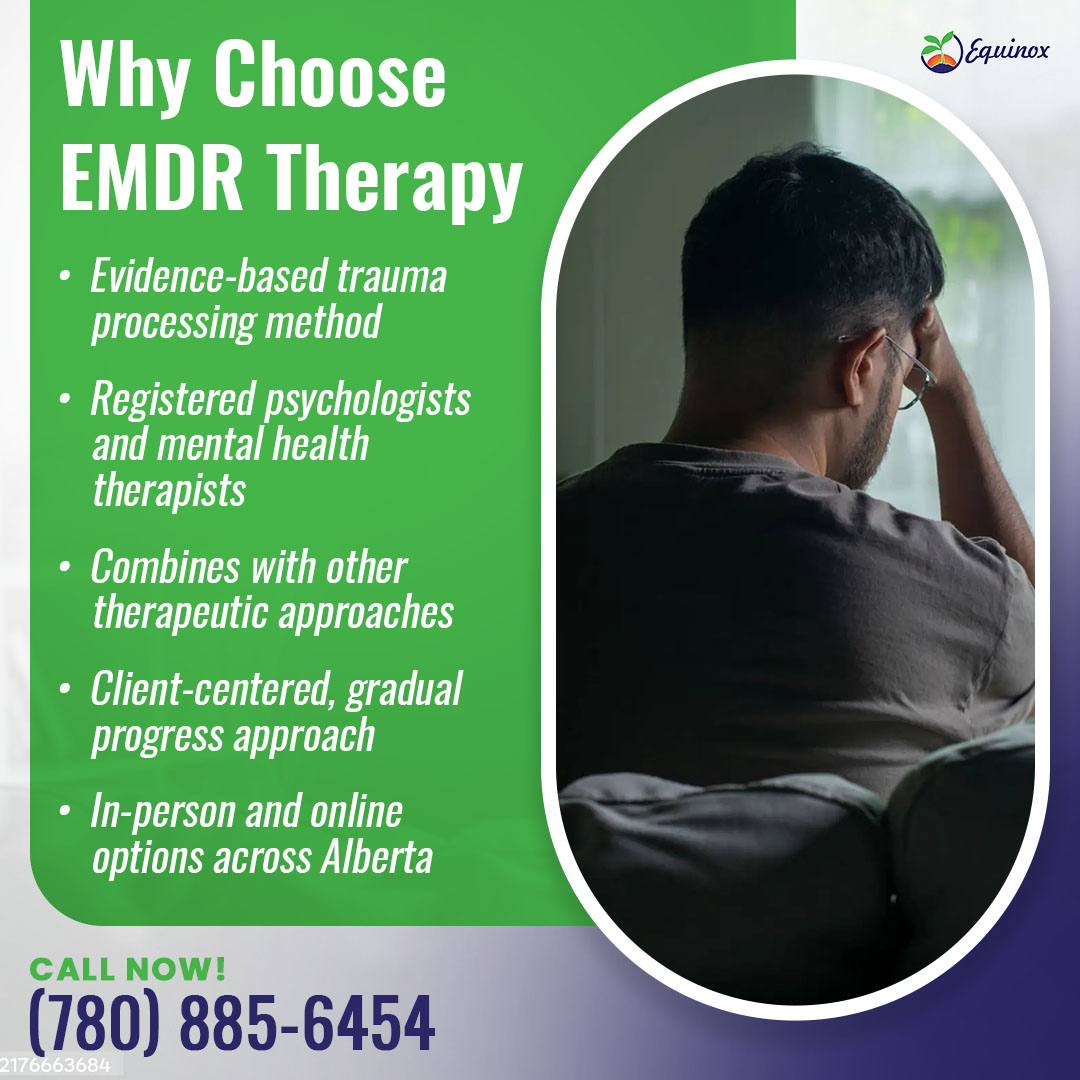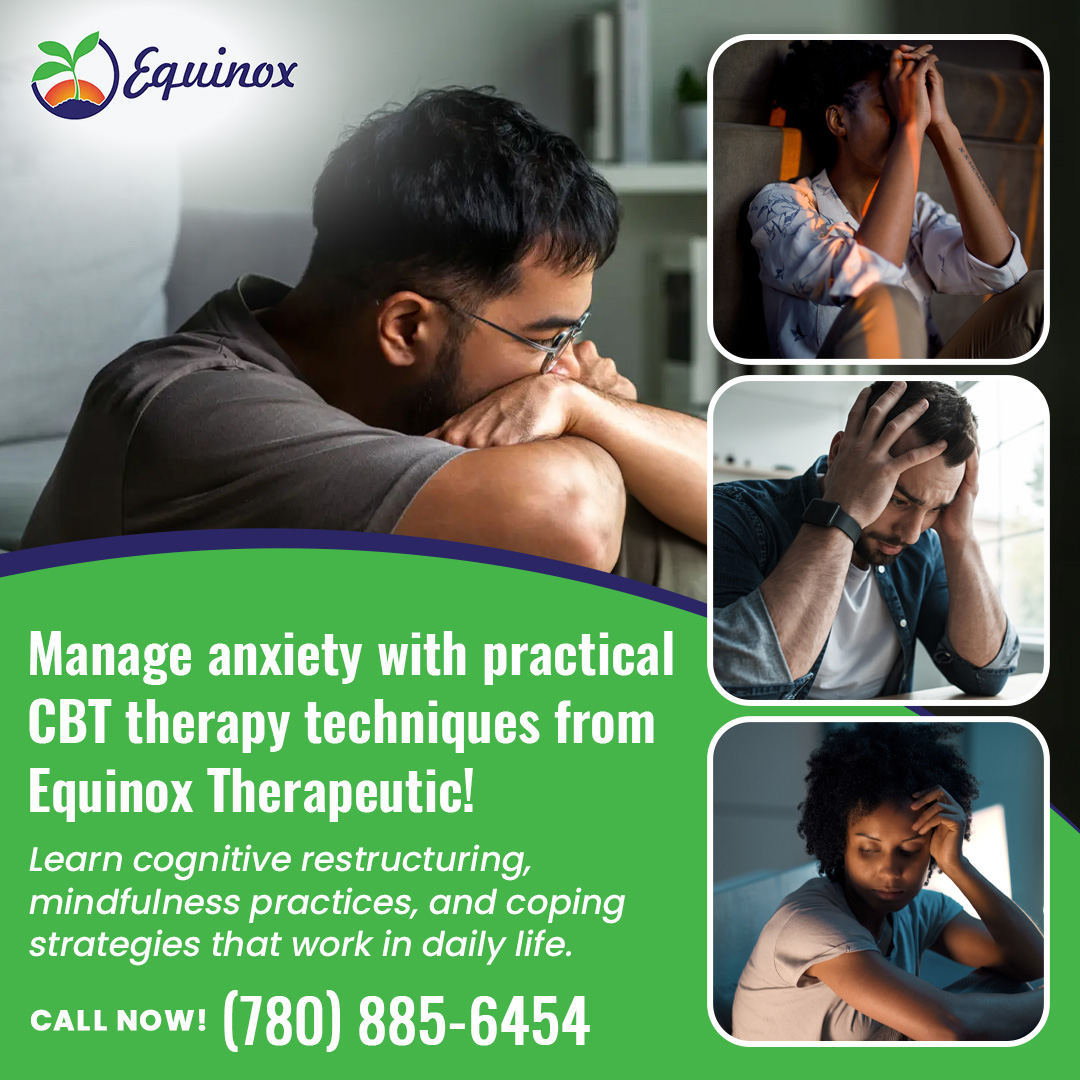Equinox Therapeutic And Consulting Services offers trauma therapy designed to support individuals coping with the effects of trauma. Trauma therapy in Edmonton includes various approaches that address emotional and psychological challenges following distressing experiences. Knowing the types of trauma counselling can help individuals find suitable care.
Trauma counselling in Edmonton is provided by skilled trauma psychologists using specialized methods. These approaches assist clients in managing symptoms, processing traumatic memories, and improving overall well-being. Exploring the different types of trauma therapy available offers clarity for those seeking support tailored to their needs.

What Is Trauma Therapy?
Trauma therapy is specialized counselling aimed at helping individuals process and heal from traumatic experiences. A therapist in Edmonton offers trauma therapy to support those affected by abuse, accidents, or violence. These events can cause lasting emotional and psychological effects that impact daily life. Trauma therapy provides a structured and safe space to work through these challenges and begin healing.
Trauma therapy focuses on recovery by addressing how traumatic events affect your mental and emotional health. A trauma psychologist in Edmonton uses specific techniques like Cognitive Behavioural Therapy (CBT), Eye Movement Desensitization and Reprocessing (EMDR), or somatic experiencing to help you manage overwhelming feelings and restore emotional balance.
Common Symptoms
Trauma therapy often targets symptoms like anxiety, flashbacks, and emotional numbness. Other symptoms include irritability, trouble sleeping, and heightened alertness, which can affect your overall well-being and relationships. Trauma counselling in Edmonton applies evidence-based approaches tailored to your needs. For example, exposure therapy may reduce flashbacks, while mindfulness techniques can ease anxiety and improve sleep.
Types of Trauma Therapy Offered in Edmonton
If you are seeking trauma therapy in Edmonton, several specialized approaches can help you process difficult experiences and regain emotional balance. Each type of therapy offers unique techniques tailored to different needs. Understanding these options can help you decide what suits you best.
Eye Movement Desensitization and Reprocessing (EMDR) Therapy
EMDR therapy reduces emotional distress by using guided eye movements while recalling traumatic events. This method is commonly used for post-traumatic stress disorder (PTSD). During a session, you will be asked to focus on specific eye movements or other forms of bilateral stimulation while thinking about distressing memories.
This process helps your brain reprocess these memories so they lose their intense emotional charge. Many people find EMDR helpful when they struggle to talk about trauma in detail. It’s an effective option for trauma caused by abuse, accidents, or violence.
A therapist in Edmonton trained in EMDR will guide you step-by-step through this treatment, helping reduce anxiety and intrusive memories linked to trauma.
Cognitive Behavioural Therapy (CBT) for Trauma
CBT helps change negative thought patterns linked to traumatic experiences. You learn to identify unhelpful beliefs that may increase anxiety, depression, or stress. By challenging and reframing these thoughts, CBT supports healthier mental habits.
In addition to thought restructuring, CBT teaches coping skills like relaxation techniques, problem-solving, and positive behaviour changes. The therapy is structured and focused on measurable goals, often lasting several months.
CBT is widely researched and effective for both adults and adolescents. Trauma psychologists in Edmonton often use CBT to help clients regain control over their thoughts and emotions after trauma.
Trauma-Focused Cognitive Behavioural Therapy (TF-CBT)
TF-CBT is designed specifically for children and teens who have experienced trauma. It adapts cognitive behavioural therapy principles to fit young clients’ needs, often involving parents or caregivers in sessions.
Children can experience trauma differently from adults. TF-CBT helps young people understand their feelings and develop healthy coping mechanisms. Family involvement encourages a supportive environment and improves communication.
TF-CBT addresses key areas like emotion regulation, relaxation, and gradual exposure to trauma memories. Families seeking trauma counselling in Edmonton often find this approach useful for supporting their children’s recovery from abuse, neglect, or violence.
Somatic Experiencing Therapy
Somatic Experiencing therapy focuses on how trauma affects your body. Trauma can cause tension, nervous system imbalances, and physical symptoms such as chronic pain or heightened startle responses.
Instead of focusing only on thoughts, this therapy helps you tune into bodily sensations connected to trauma. You learn to safely release stored tension and improve your body’s natural ability to regulate stress.
This approach is especially helpful if you experience physical symptoms or find it difficult to process trauma verbally. Somatic Experiencing therapy complements other treatments, offering a holistic way to heal.
A trauma psychologist or therapist in Edmonton trained in this method will tailor sessions based on your body’s signals, helping you regain calm and balance.
Equine-Assisted Therapy
Equine-assisted therapy uses interaction with horses to support emotional healing. Horses are highly intuitive and respond to human emotions, creating opportunities to build trust, patience, and emotional awareness.
Activities such as grooming or leading horses encourage non-verbal communication and boundary-setting. This therapy can improve self-confidence and coping skills in a safe, natural environment.
For those who find traditional talk therapy difficult, equine-assisted treatment offers a different way to engage with healing. Some trauma counselling centers in Edmonton include this option for individuals coping with trauma from abuse or attachment challenges.
Each of these trauma therapies offers a distinct path toward recovery. By consulting with a trauma psychologist or therapist in Edmonton, you can explore which approach fits your journey best.
The availability of diverse trauma therapy options makes sure that you can find support that matches your comfort level and needs. If you’re ready to begin, many qualified professionals in Edmonton can provide assessments and develop a treatment plan tailored to your experience.
What to Expect During Trauma Therapy Sessions
Starting trauma therapy can bring many questions about how sessions work and what you might experience. Knowing the process helps prepare you for what lies ahead.
Initial Assessment Process
Therapy begins with an initial assessment to review your history and symptoms. This step allows your therapist in Edmonton to gather important information about your experiences and current challenges. The assessment helps create a personalized treatment plan based on your needs.
During this stage, you’ll discuss your trauma history, emotional symptoms, and any physical effects. This conversation may also include your goals for therapy. The assessment often spans one or two sessions, allowing enough time to build trust and understanding.
Typical Therapy Session Structure
Sessions are structured to include meaningful discussions and trauma-focused exercises. Trauma therapy in Edmonton may involve talking through your experiences, learning coping strategies, or practicing specific techniques like eye movement or breathing exercises.
Sessions typically happen weekly or biweekly, but frequency depends on the therapy approach and your progress. Early sessions often focus on building safety and stability. As you become more comfortable, the therapy may move toward processing traumatic memories or developing new skills to manage symptoms.
Safety and Confidentiality in Sessions
Therapists follow strict confidentiality rules to protect your privacy. You will be encouraged to speak openly in a safe and supportive environment. Confidentiality builds trust and helps you feel secure sharing personal experiences.
Therapists in Edmonton adhere to professional ethical standards that require keeping your information private, with rare exceptions such as safety concerns. This assurance allows many clients to explore difficult emotions without fear of judgment or exposure.
How to Choose the Right Trauma Therapy in Edmonton
Selecting a trauma therapy approach is a personal process influenced by several important factors. Understanding these can help you find a fit that supports your healing journey.
Factors Influencing Therapy Choice
The right therapy depends on your trauma type, symptom intensity, and personal preferences. Different therapies address various aspects of trauma. For example, Eye Movement Desensitization and Reprocessing (EMDR) might help process traumatic memories, while Somatic Experiencing focuses on bodily sensations.
Some therapies work better for certain types of trauma or symptoms. You might find one method easier to engage with than another, which can impact progress. Your goals, such as managing anxiety or improving emotional regulation, also play a role in selecting the approach.
Role of Therapist Expertise
Therapists’ experience and training in trauma care contribute to effective treatment. Therapists and trauma psychologists in Edmonton typically complete specialized training to apply evidence-based trauma therapies correctly. Many follow guidelines set by professional regulatory bodies to provide ethical and competent care.
Choosing a therapist familiar with the specific therapy you prefer can enhance the quality of treatment. You can ask about their experience with trauma therapy approaches and how they tailor treatment to individual needs.
Personal Preferences and Comfort
Your comfort with the therapy style and therapist influences outcomes. Some clients benefit most from traditional talk therapies, while others prefer experiential methods like Equine-Assisted Therapy or Somatic Experiencing. Feeling safe and understood during sessions encourages engagement and openness.
Taking time to meet different therapists or discuss their methods can help you decide what feels right. Trusting your sense of what works best is an important part of choosing a therapy.

The Role of Equinox Therapeutic and Consulting Services in Trauma Therapy
Equinox Therapeutic And Consulting Services supports individuals seeking trauma therapy in Edmonton through a range of tailored mental health services.
Overview of Services Offered
Equinox Therapeutic And Consulting Services provides trauma therapy and mental health support delivered by skilled therapists in Edmonton. Our team includes professionals trained in multiple trauma therapy approaches such as EMDR, CBT, and somatic methods. The service addresses a variety of trauma-related concerns, including PTSD, anxiety, and emotional regulation difficulties.
The clinic also offers trauma counselling, creating a safe space for clients to explore their experiences and work toward recovery. This range of services allows clients to find support that matches their unique needs.
Approach to Trauma Therapy
Equinox Therapeutic And Consulting Services uses personalized treatment plans guided by evidence-based practices and client preferences. Our therapists at Equinox Therapeutic And Consulting Services collaborate with clients to understand their history and current challenges. This client-centred approach respects individual goals and comfort levels while adhering to professional ethical standards.
Our team works within the guidelines of regulatory bodies in Alberta, which helps maintain high standards of confidentiality, professionalism, and care. This structure supports a respectful and supportive environment essential for trauma therapy.
Get Support for Trauma Therapy Today!
If you’re ready to take the next step toward healing, Equinox Therapeutic and Consulting Services is here to help. Our experienced team offers compassionate trauma therapy tailored to your needs.
Contact us at (780) 885-6454 or email [email protected] to schedule a consultation and begin your path to recovery.



